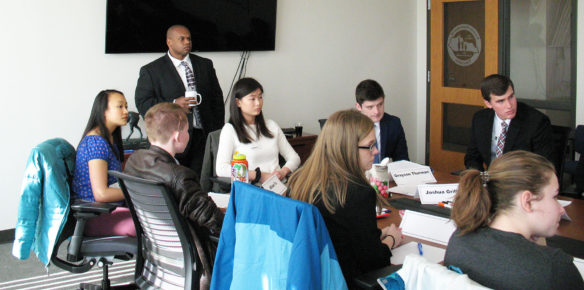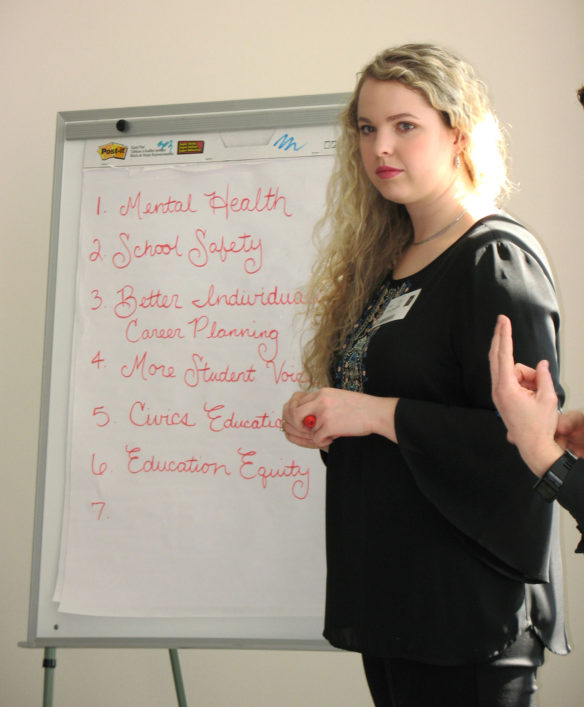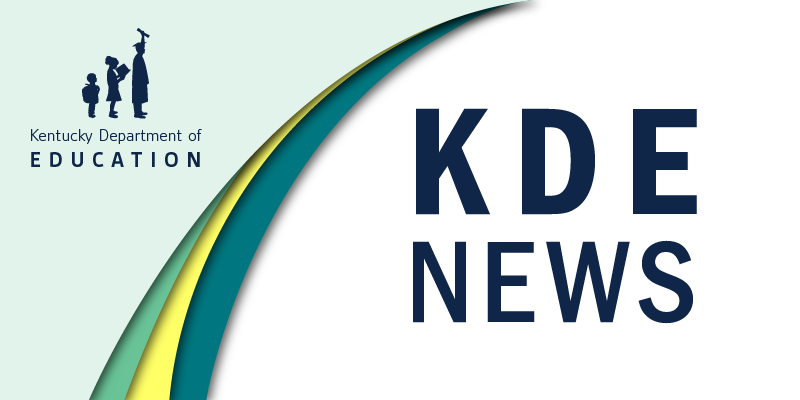
Education Commissioner Wayne Lewis, center, met with members of the Commissioner’s Student Advisory Council on Feb. 13. Twenty-six students from across Kentucky were selected to serve on the council, which advises the Kentucky Department of Education about how policies impact students in the classroom.
Photo by Donna Melton, Feb. 13, 2019
The Kentucky Department of Education’s Commissioner’s Student Council met Feb. 13 for the first time in the 2019-2020 school year. During the meeting, students from across the state met with Education Commissioner Wayne Lewis and Kentucky Elementary Teacher of the Year NyRee Clayton-Taylor to talk about the issues and challenges facing today’s high school students.
After working in groups, the students identified a top 10 list of issues that was presented to Lewis during a discussion on ways to address their concerns. The students top 10 list included:
- Improve mental health supports
- Improve school safety
- Improve individualized career planning
- Give students more voice in school decisions
- Improve civics education at the high school level
- Increase education equity
- Increase the quality of educators
- Diversify educators
- Increase access to after-school programs
- Eliminate stigma from CTE classes
While topics such as improving mental health supports and school safety have received much attention following last year’s shooting at Marshall County High School, the group told Lewis that teacher quality and inclusion of all student groups in educational opportunities and decision making is of equal importance.

Laura Duke, a senior from the iLEAD Academy/Owen County, takes notes about the top concerns of students serving on the Commissioner’s Student Advisory Council. The group’s concerns, which were shared with Education Commissioner Wayne Lewis, ranged from school safety to increasing diversity in the teacher workforce.
Photo by Jennifer Ginn, Sept. 13, 2019
Katelynn Perkins, an 11th-grader at Glasgow High School (Glasgow Independent), spoke about her experience in a biomedical class. She said she values teachers who have been in the workforce and know what they are teaching from actual experience.
“We’re learning more and progressing faster with a teacher who is a former nurse than one that had no experience outside of the classroom,” said Perkins.
Lewis pointed out the shortage of career and technical education instructors statewide, saying that the Kentucky Department of Education (KDE) is increasing its efforts to recruit seasoned professionals to these positions. He noted that KDE also is working to recruit young people to teaching careers through incentives.
“Teacher shortages have been occurring nationwide for about 10 years,” said Lewis. “In Kentucky, until recently, we were losing teachers to border states where all teachers were not required to earn master’s degrees. The Education Professional Standards Board recently voted to change that requirement after finding that there is no tie between a master’s degree and teacher effectiveness. While teachers still have financial incentives to earn a master’s, it is no longer required.”
Additionally, Lewis pointed to the Kentucky Academy for Equity in Teaching loan forgiveness program, recently announced by KDE, which is aimed at increasing teacher diversity in the workforce.
Caleb Spencer, an 11th-grader at Wolfe County High School, also raised the issue of equity in the classrooms.
“The top 10 percent of students get more opportunities than the average or below-average students. Some kids don’t know what’s out there, and teachers and counselors do not tell them because they are too busy with the high performers,” said Spencer.
Lewis told the students that the issue of equity goes to the heart of KDE’s mission and vision, to make sure each and every student is empowered and equipped to pursue a successful future by raising the bar on education outcomes and closing the widening socioeconomic and racial achievement gaps between students.
“Some Kentucky schools and districts have made more progress with addressing gaps, but others have gaps that are significantly greater,” he said, quoting a commentary he penned on the achievement gaps. “And while students of color typically make up smaller percentages of students in Kentucky school districts, the majority of students enrolled in Kentucky public schools come from economically disadvantaged backgrounds. We must acknowledge our challenges and address them head on.”




Leave A Comment